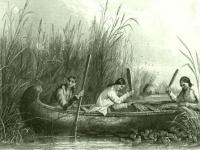Who Owns Wild Rice?
 Illustration: S. Eastman, 1853. (public domain image)
Illustration: S. Eastman, 1853. (public domain image)
by Jeff Nygaard, Nygaard Notes
Whenever we look at the world from an indigenous perspective the issues of ownership and wealth come up almost immediately. In a series from this past October called “Midwest Mining Rush Threatens Water,” the Public Education Center (PEC) reported that “In the upper Midwest, mining companies estimate there is the largest deposit of copper, nickel and precious stones in North America encased in nearly 5 billion tons of low-grade rock.” The PEC explains that “Because the region suffers some of the highest unemployment rates in the nation, there is enormous pressure to let the mining companies come.” Let them come, that is, and engage in sulfide mining that, according to the Friends of the Boundary Waters Wilderness, “contaminates lakes, rivers, and groundwater,” in the process causing damage to “human health, fish, wildlife, and entire ecosystems.”
One thing that would be damaged by the proposed mining operations would be the wild rice that grows in the area. As the White Earth Land Recovery Project explains, wild rice is a “sacred food” that “is a central part of Anishinaabeg culture and tradition.” Minnesota Public Radio reports that “High levels of sulfates released from Minnesota's mining industry are suspected of diminishing Minnesota's native wild rice beds.” That’s part of the reason Minnesota currently has rules that limit sulfates in wild rice waters.
The advocacy group Water Legacy reminds us that “It is prudent to ask the political question, whether we really want to sacrifice our water for jobs.” And water may not be the only thing that would be sacrificed if the mining companies are allowed to come.
In the corporate media in Minnesota this case has been reported as a dispute about “regulation,” the enforcement of rules, the role of the Minnesota Pollution Control Agency, and so forth. But the disputed ideas underneath all of those issues are fundamental ideas about ownership and control. On the one side is the dominant capitalist culture, in which land is “owned” and the owner can do with it whatever he or she likes. So a mining company can operate a mine on land that it “owns” if it can abide by the necessary regulations. (Here we are, talking about regulations again.)
On the other side are the traditions and culture of the indigenous people of the area, and the foods with which they have been in relationship from time immemorial. The indigenous people who rely so heavily on wild rice do not claim to “own” it. No one can “own” what is wild, after all. But they do claim that no one has the right to destroy this resource that is sacred to the people, that is a central part of an ancient and living culture.
The indigenous claim on the wild rice—or, rather, the indigenous relationship with wild rice—implies a right to stop the mining companies (or anyone else) from killing it. But this only makes sense if we throw out the idea of “ownership” entirely. Because if “ownership” were to settle this issue, then it would be theoretically possible for native people to “own” the rice and to kill it themselves, should they so desire. That is, they would have the “right” to do what they wish with “their” rice. But not everyone sees things this way, a fact which is hinted at by use of the word “sacred” in describing the rice.
(Somewhat ironically, the dominant culture likes to talk about something called The Enlightenment, one of the ideas of which was the idea of “natural rights,” which we know as “inalienable” rights, and which the U.S. Declaration of Independence says come from the “Creator.” Such rights are “self-evident,” and cannot be taken away by governments. I think this is another way of saying “sacred,” perhaps. But I digress...)
The Forum on Privatization and the Public Domain, a Canadian anti-privatization group, explains that the question here is “the question of how indigenous peoples are to conserve their culture, language, spirituality and ecology without being forced to ‘own’ it according to the property laws of the dominant culture.”
Culture, language, spirituality and ecology are invisible—if not inconceivable—in the market. So we argue about rules and regulations when the issues go much deeper, out of the view of most of us.



 del.icio.us
del.icio.us Digg
Digg












You sure can write and teach and inspire. Keep writing - I'll keep reading.
Post your comment